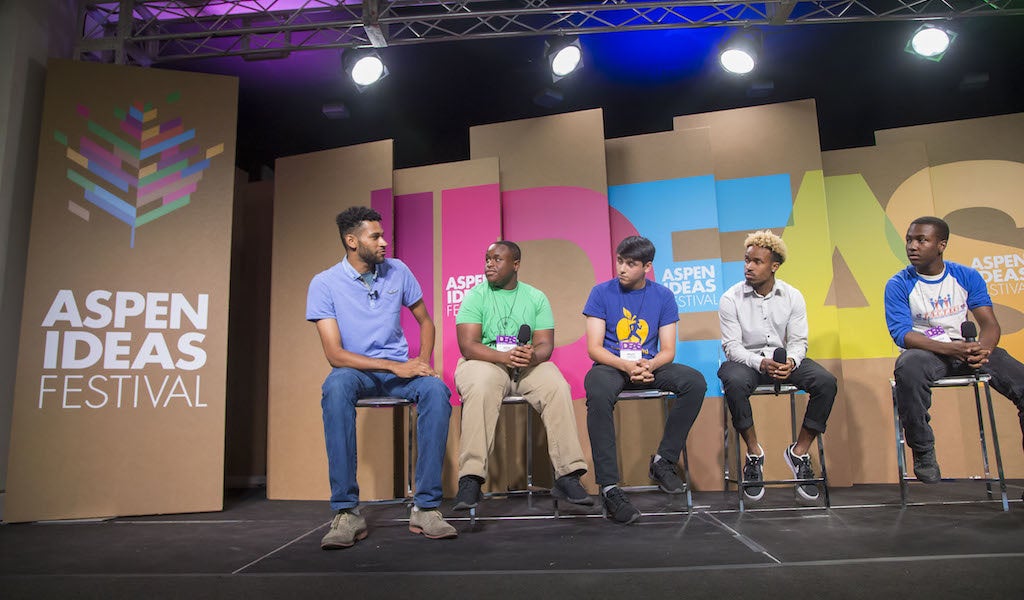
This past summer, I was invited to the Aspen Ideas Festival to moderate a panel of young leaders from winning Aspen Challenge teams. One morning, on my way to one of the breakfast buffets, I was asked to contribute my six words for Michele Norris’s Race Card Project, which had a booth set up nearby.
“Let me eat first,” I told her. “Trust me.”
I know what I’m capable of when I’m hangry. Being hangry involves being just the right mix of tired, hungry, and irritable, something many humans experience when we aren’t adequately fed.
Being hangry isn’t anything new to communities like my hometown of Inglewood, California. Inglewood is a food desert, meaning we don’t have regular access to fresh, healthy, and affordable produce. And everyone feels the pangs.
I first learned about food deserts four years ago as a senior at Westchester High School and a member of one of the inaugural Aspen Challenge teams in Los Angeles. In high school, I saw kids selling Hot Cheetos, sour worms, and even burritos out of their lockers. To the administration, this was an incredibly aggravating issue, but our Aspen Challenge team saw industrious and creative youth who were making the best of what they had to work with.
Considering the pervasiveness of the issue and the impact our team felt we could have on our community, our Aspen Challenge team decided to tackle the challenge issued by Kristin Groos Richmond: use food to bring peers together and create a healthier community.
Our solution included building an aquaponic greenhouse in an empty lot on our high school’s campus, then we set up a curriculum and farmers market around it. In the eight weeks between the start of the challenge and our presentation, we developed a lesson plan, built the foundation and framework of the greenhouse, compiled a cookbook, and raised several thousand dollars in funds from community organizations. We involved local businesses, urban-farming experts, and parents; we even got the LA City Council to pass an initiative supporting our work. We won the challenge and the trip to the 2013 Aspen Ideas Festival.
But soon after landing in Aspen, the team realized we weren’t in Inglewood anymore. It was a bit of a culture shock, coming from a place with a liquor store on every corner to a place with Pom juice stands on every corner. I felt over my head on a campus where folks like Ta-Nehisi Coates, Tony Fadell, and Arianna Huffington could be found enjoying Wonderful pistachios and chicken jerky.
It wasn’t until we had to present our solution that I finally felt like I belonged in Aspen. People wanted to believe in me, connect with me, and invest in me because of the impact the team had on our community and the problem-solving potential we possessed. As I went to more talks and panels, I was exposed to some of the greatest thinkers and doers on the planet. I would engage speakers between sessions, collecting advice, names, and business cards. Slowly I began to envision myself in their shoes, thinking of business ideas, policies, designs, and solutions.
After landing back at LAX, I saw the greenhouse through different eyes. I saw an urban-farming revolution, a rallying cry for a community, and a beacon of inspiration for young people ready to do something. There was a lot of work to be done.
Four years after we built it and four years after my visit to Aspen, the greenhouse remains an invaluable part of the community and an educational asset, and I’m incredibly grateful to have had the privilege of being involved in its development. What really excites me, though, is that thousands of youth across the United States are now picking up their shovels, laptops, and pens, and confronting the toughest issues in their communities head-on.
Aspen Challenge doesn’t just bring awareness to issues or teach young people how to think critically. It inspires entire communities to put their heads together and answer the challenge. It forces politicians, media, and business leaders to recognize and respect youth voices. It opens the eyes of young people so we look at problems differently, and it sets up a framework for us to address whatever challenges we set our eyes on. But most importantly, it gives us a taste of the impact we can have on our surroundings, and the agency to empower ourselves and our peers to make it happen.
I went back to Michele’s booth and wrote my six words: “Feed the world, we’re all hangry.”
Nick Davis is a 2013 alumnus of the inaugural Aspen Challenge: Los Angeles